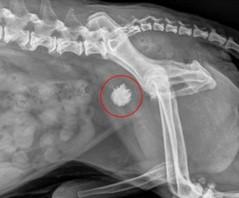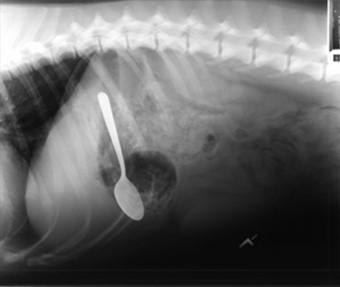Preventative (prophylactic) gastropexy
This is often recommended in large breed dogs with a deep chest like Great Danes, Doberman Pinschers, Mastiffs, etc, as these dogs are prone to developing a life-threatening emergency twisting of their stomach called gastric dilation and volvulus (GDV). This surgery creates a permanent adhesion between the stomach and body wall to prevent abnormal twisting of the stomach.
Biopsies
If your pet has problems with high liver values (elevated liver enzymes), or a suspected digestive issue like inflammatory bowel disease (IBD), your veterinarian may recommend taking biopsies of these organs. Sometimes, other abnormalities like large lymph nodes, may lead to your veterinarian to recommend a surgical biopsy. During these procedures a small sample of the abnormal tissue is taken and submitted to the diagnostic lab by your veterinarian, to determine the underlying cause of the abnormality and to help guide the best treatment for your pet.
Splenectomy
Masses or other problems in the spleen may lead to your veterinarian recommending splenectomy (removal of the spleen). This is typically well tolerated in dogs and cats, but sometimes abnormal heart rhythms (arrhythmias) can be seen- for this reason, hospitalization with close ECG monitoring after removal of the spleen is recommended.
Bladder stones
There are different types of bladder stones that can be seen in dogs and cats. Often, if your pet is having irritation from the stones, large stones or multiple stones, your veterinarian may recommend surgical removal. Without removal of bladder stones, they can lead to a urinary obstruction- a stone becomes stuck in the urethra (the tube that allows the bladder to drain during urination). If a stone becomes stuck, it can be a life-threatening emergency and can even lead to bladder rupture.

Body wall hernias
A separation in the muscle wall of the abdomen can happen as a result of trauma, or some animals are born with this problem. It can lead to organs inside of the abdominal cavity becoming stuck within the muscular separation- creating pain and illness. The surgery replaces the organs back into their normal location, and permanently corrects the muscular separation.
Intestinal masses
Masses in the intestines can be cancerous, or non-cancerous- but often require surgery to remove the blockage and allow pets to eat normally without pain. The intestinal mass is removed by removing a portion of the intestine (this procedure is called an intestinal resection and anastomosis, or R & A). Further treatment such as chemotherapy may be recommended by your veterinarian depending on the results of the biopsy.

